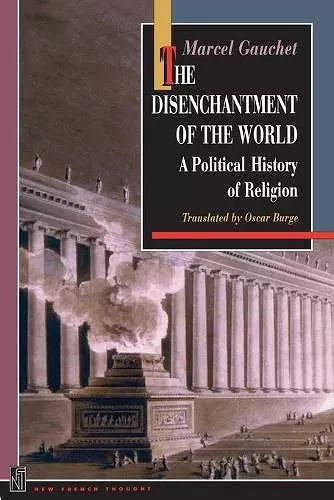The Disenchantment of the World
A Political History of Religion
Marcel Gauchet author Oscar Burge translator
Format:Paperback
Publisher:Princeton University Press
Published:5th Nov '99
Currently unavailable, and unfortunately no date known when it will be back

The scope, freedom of thought, and analytical rigor of this book make it essential reading. -- Jean-Jacques Courtine, University of California, Santa Barbara Marcel Gauchet's The Disenchantment of the World is breathtaking in its ambition, offering nothing short of a new theory of the birth of modernity out of the spirit of Christianity. -- Brian C. Anderson, "First Things"
Interprets the development of the modern west, with its political and psychological complexities, in terms of mankind's changing relation to religion. This book views Western history as a movement away from religious society, beginning with prophetic Judaism, gaining momentum in Christianity, and leading to the rise of the political state.Marcel Gauchet has launched one of the most ambitious and controversial works of speculative history recently to appear, based on the contention that Christianity is "the religion of the end of religion." In The Disenchantment of the World, Gauchet reinterprets the development of the modern west, with all its political and psychological complexities, in terms of mankind's changing relation to religion. He views Western history as a movement away from religious society, beginning with prophetic Judaism, gaining tremendous momentum in Christianity, and eventually leading to the rise of the political state. Gauchet's view that monotheistic religion itself was a form of social revolution is rich with implications for readers in fields across the humanities and social sciences. Life in religious society, Gauchet reminds us, involves a very different way of being than we know in our secular age: we must imagine prehistoric times where ever-present gods controlled every aspect of daily reality, and where ancestor worship grounded life's meaning in a far-off past. As prophecy-oriented religions shaped the concept of a single omnipotent God, one removed from the world and yet potentially knowable through prayer and reflection, human beings became increasingly free. Gauchet's paradoxical argument is that the development of human political and psychological autonomy must be understood against the backdrop of this double movement in religious consciousness--the growth of divine power and its increasing distance from human activity. In a fitting tribute to this passionate and brilliantly argued book, Charles Taylor offers an equally provocative foreword. Offering interpretations of key concepts proposed by Gauchet, Taylor also explores an important question: Does religion have a place in the future of Western society? The book does not close the door on religion but rather invites us to explore its socially constructive powers, which continue to shape Western politics and conceptions of the state.
"There is a stubborn kernel of truth here. It is that a liberal order may find a friend in religion because God's otherness is what makes us free: free to believe and free not to believe. Western history is the unfolding of this irony."--Jean Bethke Elshtain, The New Republic
ISBN: 9780691029375
Dimensions: unknown
Weight: 369g
272 pages